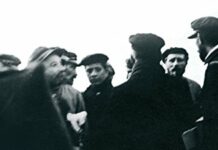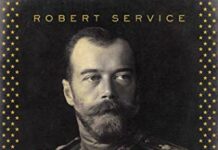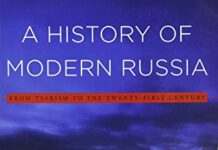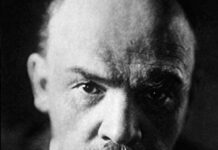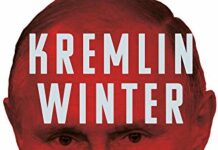
Ebook Info
- Published: 2006
- Number of pages: 736 pages
- Format: PDF
- File Size: 7.44 MB
- Authors: Robert Service
Description
Overthrowing the conventional image of Stalin as an uneducated political administrator inexplicably transformed into a pathological killer, Robert Service reveals a more complex and fascinating story behind this notorious twentieth-century figure. Drawing on unexplored archives and personal testimonies gathered from across Russia and Georgia, this is the first full-scale biography of the Soviet dictator in twenty years.Service describes in unprecedented detail the first half of Stalin’s life–his childhood in Georgia as the son of a violent, drunkard father and a devoted mother; his education and religious training; and his political activity as a young revolutionary. No mere messenger for Lenin, Stalin was a prominent activist long before the Russian Revolution. Equally compelling is the depiction of Stalin as Soviet leader. Service recasts the image of Stalin as unimpeded despot; his control was not limitless. And his conviction that enemies surrounded him was not entirely unfounded.Stalin was not just a vengeful dictator but also a man fascinated by ideas and a voracious reader of Marxist doctrine and Russian and Georgian literature as well as an internationalist committed to seeing Russia assume a powerful role on the world stage. In examining the multidimensional legacy of Stalin, Service helps explain why later would-be reformers–such as Khrushchev and Gorbachev–found the Stalinist legacy surprisingly hard to dislodge. Rather than diminishing the horrors of Stalinism, this is an account all the more disturbing for presenting a believable human portrait. Service’s lifetime engagement with Soviet Russia has resulted in the most comprehensive and compelling portrayal of Stalin to date.
User’s Reviews
Editorial Reviews: Review “Here is a life-and-times biography in the grand style: deeply researched, well written, brimming with interpretations. Oxford historian Service, author of an acclaimed biography of Lenin, provides the most complete portrait available of the Soviet ruler, from his early, troubled years in a small town in Georgia to the pinnacle of power in the Kremlin. Most previous biographers have depicted Stalin as a plodding figure whose only distinguishing characteristic was brutality. But Service describes a man who was intelligent and hardworking, who learned from experience and who played an important role in the Russian revolutionary movement…By providing such a rich and complex portrait of the dictator and the Soviet system, Service humanizes Stalin without ever diminishing the extent of the atrocities he unleashed upon the Soviet population.”―Publishers Weekly“For an understanding of Stalin the man, the leader, the Georgian, the Russian nationalist, the revolutionary, the party politician, the mass murderer and the international statesman, and his place in modern Russian history–Robert Service’s book is unsurpassed.”―Harold Shukman, author of Stalin’s Generals“[A] profound and readable assessment of the Soviet dictator…. Service paints a picture of a ruthless man absorbed in the pursuit of politics, widely read, perceptive, cunning and, despite a self-effacing and isolated persona, the stuff of leadership.”―Richard Overy, The Mail on Sunday“Service revises every dimension of this multidimensional titan. His book emphasizes the importance of Marxist ideology, economics and Bolshevik culture. But it also rightly presents a human Stalin … Gritty and unshowy, but enlightened by Service’s compelling characterization, magisterial analysis and dry wit, this outstanding biography of lightly worn authority, wide research and superb intuition will be read for decades.”―Simon Sebag Montefiore, author of Stalin: The Court of the Red Tsar“Robert Service’s brilliant biography of Stalin is a major work: the fruit of long research, profound insight and understanding of his subject. It offers a truly rounded and thoroughly readable portrait of this monstrous figure.”―Andrew Roberts, Daily Telegraph“This is effectively the first full biography since perestroika to encompass the economic, political, diplomatic, military, administrative and, above all, ideological dimensions, as well as the personal aspects of Stalin’s colossal life. Gritty and unshowy, but enlightened by Service’s compelling characterisation, magisterial analysis and dry wit, this outstanding biography of lightly worn authority, wide research and superb intuition will be read for decades.”―Simon Sebag Montefiore, Sunday Times“A profound and readable reassessment of the Soviet dictator…Service paints a picture of a ruthless man absorbed in the pursuit of politics, widely read, perceptive, cunning and, despite a self-effacing and isolated persona, the stuff of leadership…Stalin was no fool; he could scarcely have become dictator of a vast nation if he had been. Yet his contemporaries, and many historians since, have underestimated him. Service makes sense of Stalin’s achievements by making us take him seriously…Stalin’s power at its peak was immense and daunting. Service reminds us that a quarter of Russians recently polled put the Stalin years top of the list of periods in Russian history they most admired…This shrewd biography helps us understand clearly and dispassionately why not everyone remembers Stalin as a murderous ogre.”―Richard Overy, The Mail on Sunday“Service triumphs in portraying Stalin’s personality in the context of his times…This book is a tour de force. Not only does Service trace Stalin’s road to dictatorship, he shows us what he did with absolute power…No one has shown in more convincing detail than Service Stalin’s evolution to the absolute power that corrupts absolutely. It is, above all, a balanced account. He has the courage to confess that the monster, in his shabby clothes and wornout boots, dying alone in his dacha, soaked in his own urine, remains for him an enigma, not least because of the tyrant’s consistent massaging of his own image.”―Raymond Carr, The Spectator“In his new biography of the Soviet dictator, Robert Service has given the most convincing description yet of how Stalin’s insecure Georgian childhood fashioned his psychology. At key points in the book, we are reminded of Stalin’s duality–on the one hand he was a proud Caucasian toughie who organized bank robberies and could drink spirits all night. On the other, he was a man who aspired to understand and interpret (crassly) high art and politics…This is the first serious political biography of Stalin since the opening of the archives in Moscow and St. Petersburg in the 1990s and Service has made good use of them.”―Misha Glenny, Irish Times“In Service’s eyes, Stalin remains ruthless, cunning and murderous. But a richer and more complex individual emerges–and a more human one. Stalin is shown as lover, husband and father. A man who wrote poetry and loved singing. A serious communist political thinker and the best-read Russian leader since Catherine the Great…[Service] has written a masterly book, with great erudition, style and wit. Although there are still some Soviet-era archives that remain closed, this biography will surely stand the test of time.”―Stefan Wagstyl, Financial Times“In the course of this engrossing and well-researched book, Stalin emerges as a fascinating, complex figure.”―Andrew Roberts, Daily Telegraph“A common perception of Stalin is that of an oafish backroom bureaucrat who bludgeoned his way to the heights of power. But this image does not do justice to the multi-faceted and fascinating person who emerges in this latest biography. Drawing on fresh archive material, historian Robert Service lays the man bare and places him within the context of his times. He paints a picture of a talented politician who was driven by a severe personality disorder to behave in the way he did…Humanising him, Service believes, will help to identify future tyrants. Here he has struck the right balance and produced an intellectually cogent and highly readable account.”―Gavin Engelbrecht, Northern Echo“Service has written an unhurried, richly detailed and rigorously researched book, anchored in hundreds of sources–a vast but cleanly structured text, polished, fluent and brisk…Service gives us a portrait of a paranoid and murderous despot, not a one-dimensional, cartoonish baddie…Service greatly advances our understanding by deftly fusing the tale of the man with that of the doctrine to which he was fanatically beholden and the ethos and practices of the tiny underground party.”―Leon Aron, Washington Post“Service’s fascinating new Stalin biography, the first comprehensive English-language treatment of his life since the opening of the Soviet archives in the mid-1990s, is full of historical what-ifs…Stalin: A Biography…is a major landmark in the recent scholarly reassessment of the notorious dictator who consolidated Soviet power, launched vicious purges against his own people (and indeed his own political party), defeated the Nazis in World War II, and launched the Cold War…Service’s trumps all other volumes now available on Stalin’s life. It synthesizes all the major narrative accounts and incorporates a good deal of revealing new information.”―Andrew O’Hehir, Salon“Service’s biography is full-scale, eking out the details of Stalin’s childhood and education (including his nearly complete seminary instruction)…Service has used material newly released from Soviet archives to understand Stalin during the Bolshevik revolution, showing how he learned butchery from Lenin and struggled to survive as Lenin’s successor. Service’s biography is…readable and accessible.”―Harry Willems, Library Journal“Stalin: A Biography…offers the most detailed account of his life, career and beliefs.”―Andrew Nagorski, Newsweek“[An] excellent new biography…Robert Service paints a picture of a warped monster of a man, insatiable in his pursuit of power, ruthless in his treatment of real and imagined rivals, remorseless in his murder of millions. Service’s innovation is to reveal Stalin’s frailty–above all, his capacity for miscalculation. He made no blunder costlier than that of June 1941; yet he himself got off scot-free.”―Niall Ferguson, New York Times Book Review“A stimulating study of a monster whose thoughts and motives remain obscure. It also serves as a reminder that unbridled power is usually a recipe for disaster.”―Lynwood Abram, Houston Chronicle“This will likely serve for a long time as the most authoritative and comprehensive one-volume study of Stalin…Service portrays Stalin as an intellectual of sorts who read widely, although always within the wobbling worldview of Marxist-Leninism and with an eye to the usefulness of ideas in expanding and maintaining his own power…Stalin: A Biography, with its low-key, frequently wry, and exhaustively researched telling of the story, will be a standard reference for years to come.”―First Things“Stalin made little distinction between his personal and political life, and as Service demonstrates in this balanced, tightly written work, it is necessary to consider each in the context of the other. Never abandoning his wide-angle lens, Service shows how Stalin’s experiences of religion, nationalism, peasant lore, and imperialism became the channels through which he funneled his radical agenda…Keenly aware that by putting a human face on the monster he is exposing himself to charges of being an apologist, Service nevertheless perseveres in setting the record straight in this comprehensive and landmark biography…By painstakingly deconstructing Stalin’s personal reinventions and self-created legacy, Service takes an important step toward revealing the man behind the myth. The more the tyrant is exposed for who he was, the harder it will become to wax nostalgic for his times.”―Rebecca Reich, New Leader“Stalin, a sequel to Mr. Service’s Lenin: A Biography, presents a richly documented, highly persuasive portrait of the man who transformed the Soviet Union into a modem military-industrial power, terrorized millions and ruled over an empire that would have been the envy of the czars…Brick by brick, Mr. Service constructs a solid, accessible work that does as much as one book can to explain Stalin as a human being, and as the architect of a system that still weighs heavy on millions of citizens in the former Soviet Union.”―William Grimes, New York Times“A striking example of what solidly researched historiography with an appeal for a wider readership might look like. Erudite yet never abstruse, comprehensive and gripping at the same time, Stalin: A Biography should become required reading for students, specialists, and anyone else interested in modern history.”―Australian Slavonic and East European Studies“Service’s impressive biography successfully challenges the conventional image of Stalin…Service has a remarkable talent for covering a lot of ground with clarity, brevity, and nuance. His portrait of Stalin is highly contextualized, and he balances his analysis of Stalin with a broader discussion of the historical events that the dictator both influenced and experienced.”―Golfo Alexopoulos, Journal of Cold War Studies“[Service’s] biography of Stalin is the first in English touching on every aspect of the dictator’s life, using resources made available since the perestroyka era and the subsequent break-up of the USSR…This book, over its 715-plus pages, reveals a definite, even definitive, mastery of its topic…The insights seem fresh and original, helped by the author’s trenchant style, his robust, short sentences…[M]ore than any other biographer, Service shows the human―indeed inhuman―figure at the centre of all this activity and his daily routine in his rise to the power of life and death over everyone in the USSR. Underpinning this is the author’s broad thesis that the personal and political in Stalin were so intermingled, as to be indistinguishable―more so than with any other tyrant…[A]ny criticism of a scholar who has scaled the mountain that is Stalin’s life, with such dedication and mastery, cannot be very substantial. The author’s very achievement casts a huge shadow―benign in his case―over any critic.”―Tony Wilson, New Zealand Slavonic Journal About the Author Robert Service is a Fellow of the British Academy and Professor of Russian History at Oxford University.
Reviews from Amazon users which were colected at the time this book was published on the website:
⭐IntroductionService `investigated not only what Stalin did but also why he did it and how he was allowed to do it’ and acknowledged that he ran the risk of humanizing Stalin. Therefore, Stalin is `examined simultaneously as leader, administrator, theorist, writer, comrade, husband and father’ and `as a psychological type, also needs to be considered – and his habits of daily life as well as the large scale of his political maneuvers and statesmanship enter the account.’ `The lesson to be learned from studying several of the twentieth century’s most murderous politicians is that it is wrong to depict them as beings wholly incomparable to ourselves.` `Not only is it wrong; it is also dangerous. If the likes of Stalin, Hitler, Mao Tse-tung and Pol Pot are represented as having been `animals’, `monsters’ or `killing machines’, we shall never be able to discern their successors.’ `Most men and women of his time, however, underestimated Stalin. It is the task of the historian to examine his complexities and suggest how better to understand his life and times.’National QuestionGeorgian patriotism influenced Stalin’s position on the national question. Early on, `he wished a distinct Marxist party to be formed in Georgia and demanded a Georgian territorial demarcation in the party.’ `Stalin too wished to be regarded as an internationalist; he also aimed to be taken seriously in Russian socialist politics. But he continued to urge the party to promote the interests of the non-Russians under a future socialist administration.’ Stalin followed the position of most Georgian Marxists who `believed that encouragement of a national consciousness would enhance political development and, ultimately, the dissemination of socialist ideas.’ Stalin was the first to introduce the national question in Pravda: `he demanded linguistic equality for the non-Russian nations. He called for regional self-rule.’`Stalin adhered to the official Bolshevik position that administrative autonomy should be given to non-Russians in areas where they lived in concentration. Thus the Bolsheviks hoped to maintain a centralized state while acceding to national and ethnic aspirations.’ `In order to be considered a nation, the Georgians had to share not only their `psychic’ background and territory but also their economic life.’ `Stalin stressed that nationhood was a contingent phenomenon. It would consequently be senseless for Marxists of any nation to identify themselves permanently with that particular nation.’ Thus, the `young poet who had called on fellow Georgians to `make renowned our Motherland by study’ had vanished. In his place there was an internationalist struggling for the cause of the proletariat of all nations.’`The Bolsheviks were trying to de-imperialize an empire without allowing its disintegration into separate nation-states and the Politburo bent over backwards to be seen to enhance conditions for non-Russians.’ For Stalin, a multi-national state was necessary for the elevation of `backward nations and nationalities into the general channel of a higher culture.’ `Since Marxism and the National Question in 1913, his axiom had been that peoples without a vigorous press and literature should not be described as nations. His premise was that such peoples should be brought to a higher cultural level by being associated with adjacent sophisticated nations.’ `Stalin’s analysis of contemporary Georgia anticipated the bringing together of Russians and Georgians in harmony within the same multinational state. Evidently he assumed that the Russian Empire, when revolution at last overthrew the Romanovs, should not be broken up into separate states. Even Russian Poland should in Stalin’s opinion s stay with Russia.’Consequently, `Stalin wished to expand the RSFSR over the entire territory held by Soviet republics and to provide Ukraine, Belorussia and the Transcaucasus with the same status as existing `autonomous republics’ of the RSFSR such as the Bashkirian Autonomous Soviet Socialist Republic. He regarded Lenin’s demand for a formal federal structure as having the potential to undermine the whole state order.’At the formation of RSFSR, Stalin withheld a Russian communist party while other peoples had their own. After Stalin had secured his power, `patriotism was making its way back on the list of official priorities.’ `While society was being split asunder by policy initiatives from the late 1920s, Stalin recognized that some cement was needed to keep the people of the USSR together.’ `It suited him to put the Russian people on an even higher pedestal of official esteem than before the war. Intuitively, it would seem, he understood that he needed to grant legitimacy to a national patriotism less qualified by Marxism-Leninism.’ In one incident that demonstrates Stalin’s desire to root Russianness in the territory of the RSFSR, Stalin claimed that `the Russian national language’ can be traced to the provinces of Kursk and Orel’It demonstrates Stalin’s desire to root Russianness in the territory of the RSFSR. 565Nevertheless Stalin did not want them turning into nationalists. He still feared the Russians. Consequently while other peoples had their own communist parties, he withheld this from the RSFSROutmaneuvering RivalsService reasoned that Stalin owed his political ascendance to connecting ideologically with the party committee members. `His idea about `socialism in one country, taken separately’ was poor Leninism; but it struck a chord with many party committee members who disliked Trotski’s insistence that the October Revolution would wither and die unless socialist seizures of power took place in other powerful countries on the European continent In line with official party policy, he made appointments to party posts on the basis of demonstrable allegiance to Bolshevism before 1917. The point is that this configuration of tendencies in ideology and policy had growing appeal for party leader in Moscow and the provinces. Stalin did not rise to supreme power exclusively by means of the levers of bureaucratic manipulation. Certainly he had an advantage inasmuch as he could replace local party secretaries with persons of his choosing. It is also true that the regime in the party allowed him to control debates in the Central and at Party Congresses. But such assets would have been useless to him if he had not been able to convince the Central Committee and the Party Congress that he was a suitable politician for them to follow. Not only as an administrator but also as a leader – in thought and action – he seemed to fit these requirements better than anyone else.’Hence, `the notion that he owed his survival to his antics as a trapeze artist is wrong. What saved him was the safety net provided by provisional allies Zinoviev and Kamenev and Trotski’s failure to attack.’ Furthermore, each of Stalin’s rivals expected to run his administrative hierarchy without interference from the others and could get on with their individual campaigns to succeed Lenin.’ Therefore, the issue of whether Trotski and Zinoviev should have been more enthusiastic participants in the Orgburo probably made little differences.Foreign PolicyStalin proved to be a shrewd politician but certainly not without flaws and was barely saved from his biggest blunder reconciling with Nazi Germany.- Finnish Independence`Lenin and Stalin encouraged the Finns to outright independence.’ `This was a policy without parallel in history. A former imperial power was insisting that one of its dependencies, whether it liked it or not, should break away from its control.’ `The motives of Lenin and Stalin were less indulgent than they seemed. Both felt that the Finnish Marxists would stand an excellent chance of achieving dominance in an independent Finland. This would enable the Bolsheviks and their comrades in Finland to resume close operational ties and, eventually, to re-include Finland in the multinational state governed from Petrograd. There was a further aspect to Sovnarkom’s policy. This was the calculation that a single act of secession from the former Russian Empire would constitute wonderful propaganda in favor of socialist revolution elsewhere, especially in eastern and east-central Europe.’- Invasion of PolandStalin did not agree with Lenin’s decision to invade Poland. `Stalin’s objections were not confined to his chronic skepticism about European socialist revolution and his concern about Wrangel. He doubted that the Red Army was adequately coordinated and organized.’ Stalin was correct in his assessment. `The secret project for the `Sovietization of Poland’ had been disastrous. The Red Army, instead of being greeted by Polish workers and peasants, had been repulsed by a `patriotic upsurge.’- Nazi-Soviet Pact `If ever there was proof that Stalin was willing to take immense risks, the Nazi-Soviet agreement provided it.’ `The reconciliation with Germany was his personal decision after consultation with Molotov.’ Stalin `had been taking a massive gamble with his country’s security. Cautious in so many ways, Stalin trusted in his ability to read the runes of Hitler’s intentions without discussing the evidence with anyone else.’- Spreading CommunismStalin’s demand of absolute obedience also added difficulties to communist parties abroad. `Stalin instructed the Executive Committee of the Comintern to order the German Communist Party to treat the social-democrats rather than Hitler’s NSDAP as the main enemy. Hegemony over the political left was to be given precedence over struggling against Nazism.’ During the Spanish Civil War, `distrust on the political left grew rapidly as members of the POUM, loyal to Trotski’s ideas, where rounded up. The political tensions on the left were not concocted out of nothing by Stalin. But he made them murderously worse than they need have been.’Stalin’s shrewd calculation was a factor in withholding aid to the Warsaw Uprising on 1 Aug. 1944. `His prevention of assistance to Warsaw involved a calculated decision about Poland’s future. The more insurgents were wiped out by the Germans, the nearer he would come to his objective. Stalin aspired to rule Poland through is communist stooges.’Cold War`The coalition which Stalin formed with the United kingdom and the USA in the Second World War had from the start been characterised by strain and suspicion.’ `The Ministry of External Affairs in Moscow explored whether funds really would be released to the USSR for its post-war recovery. The answer was that the Americans made open markets the condition for aid. As Truman and Marshall knew, there was never any chance that Stalin and his associates would accept such restrictions. The Marshall Plan was tied to the geopolitical objectives of the USA and these included the drastic reduction of the USSR’s power in Europe.` `The question arises as to who or what was to blame for the descent into the Cold War. President Truman played his part. His language was hostile to the USSR and communism. The Marshall Plan in particular was framed in such a way as to make it well nigh inconceivable that Stalin would not take offence.’`Although his strategy remained the avoidance of war with the USA, he did not mind strategy remained the avoidance of war with the USA, he did not mind making things awkward for the Americans wherever he could.’ `Elsewhere in eastern Europe there was the silence of the political graveyard; but the People’s Democracies were far from quiet below the surface: resentment of the communist seizure of power in these countries was deep, and only the threat of unconditional repression kept order for Stalin.’ `Stalin wanted to build up support for communist parties in eastern and east-central Europe. The Comintern’s dissolution was a basic precondition. It was vital for them and him to pretend that they were not Moscow’s stooges.’ `Cominform was not the Comintern reborn; but it embraced communist parties in countries where the threat to the desires of the Western Allies was acute. The purpose of the Cominform Conference was to respond to the challenge thrown down by the Marshall Plan.’`Imperfect though democracy is everywhere, it usually involves the practical provision of legal and peaceful electoral procedures. Such provision occurred nowhere in eastern Europe.’ `Stalin had acquired the regional buffer zone he craved, but only at the price of turning those countries into a region of constant repressed hostility to his purposes. His political victory in 1945-8 was bound in the end to prove a Pyrrhic one.’Personality and Rule`Stalin was psychologically complex. But he was impulsive. When his pride was offended, he lost his composure. In his early years, he offered his own resignation rather than feel humiliated. Yet, `even by offering his resignation, he was taking a huge risk. He was gambling on his exhibition of humility inducing the Central Committee, which included some of his friends, to refuse his request. He needed to put his enemies in the wrong.’ But, such ploy worked in the struggle with Zinovev and Kamenev.Stalin was also very cunning and held himself to a much lower standard than he has for others. `On 10 July after being prodded by Zhukov among others, Stalin allowed himself to be anointed Supreme Commander. Stalin had wanted to avoid too close an association with the catastrophe at the front. If the defeats continued, he would make other heads roll. .. Was this yet another sign that he had learned from biographies of the first Roman emperor, Augustus, that real power mattered more than titles? He forgave himself but not others; and when he made a mistake, it was others who got the blame.’His rule can be best characterized by divide and conquer. `Stalin expected to rule through unofficial channels; he knew that disruption of institutional regularity helped to prolong his personal despotism’. `Although continuity of administrative leadership was desirable in theory, Stalin’s higher demand was his inviolable personal power.` `Regarding the Council of Ministers, the increasing complexity of the economy required specialist knowledge lacking in the security agencies. One way was to give way to the ministerial lobby and put a stop to the party’s interference. This orientation was advocated by Georgi Malenkov. The other solution was to extend and strengthen the powers of the part advocates by Andrei Zhdanov.` `His state could do without neither government nor party; and even when he gave preference to one of them over the other, he omitted to make the choice a definitive one. The institutional tension worked to his personal advantage. By locking the two bodies in rivalry, he strengthened his position as arbiter. But this in turn meant that he had to settle for a lower level of administrative efficiency that he would otherwise have liked.’Conclusion`All institutions were in permanent contest with each other at a level vastly lower than Stalin’s imperial throne. Patronage was normalized as a political phenomenon.’ `Stalin’s system of command achieved immediate subjugation at the expense of a general consensus. The Soviet Union was a totalitarian state, but this did not mean that it was characterized by perfect central control.’ `Far from it. The more Stalin concentrated in his own hands power over specific areas of politics, the greater the lack of compliance he encountered in others. His USSR was a mixture of exceptional orderliness and exceptional disorderliness.’ `Yet he was also much more complex than is widely supposed. As a politician, he knew how to present himself selectively to diverse groups. He was a real leader. He was also motivated by the lust for power as well as by ideas. He was in his own way an intellectual, and his level of literary and editorial craft was impressive. Stalin was not a certifiable psychotic and never behaved in such a way as to be incapable of carrying out his public duties.’ `Stalin’s emergence from exile and obscurity on to a worldwide stage of power, fame and impact would have been impossible if his party had not made the October Revolution and bolted together the institutional, procedural and doctrinal scaffolding which he was to exploit. Such individuals, when they have appeared, have usually displayed congenial `ordinary’ features even while carrying out acts of unspeakable abusiveness. History seldom gives unambiguous lessons, but this is one of them.’
⭐Stalin did nothing wrong
⭐Over the years Stalin has proven to be a popular choice with biographers. He is one of the most evil people of all time with a murderous record equaled by few other dictators in human history. Perhaps his very nastiness as human being fascinates historians and authors. However in all these books, it is rare if anyone has anything new or interesting to say. Robert Service has written a book that reveals new details about one of the 20th century’s mass murderers based on archival research which would have been impossible 20 years ago (and may not be possible now). Service presents a Stalin that is probably more fully realized than previous accounts and draws upon the recent efforts of Simon Montifiore’s (Court of the Red Tsar) interviews with the surviving members of Stalin’s elite.Stalin’s legacy is one of those things that is difficult to imagine even after the publication of the Solzhenitsyn’s Gulag Archipelago (which I read as it was translated and published). While exact figures are yet to be compiled the consensus is that Stalin managed to slaughter 20 million people during his rule of the Soviet Union. This includes not only those people who were murdered because Stalin thought they lacked the customary deference to his genius, but also those victims of military blunders during WWII. Paradoxically, and this is also part of his legacy, perhaps the only positive thing, the Soviet Union probably would not have defeated Hitler had Stalin not been prepared to indulge in acts of unimaginable barbarity.Barbarism came naturally to Stalin. He grew up in a dysfunctional home in which his drunken cobbler father and sexually promiscuous mother were frequently at odds with each other. Though intended by his traditionalist mother for the priesthood (she made him swear he had nothing to do with the murder of the Tsar), he was drawn to the conflict ridden world of the Bolshevik Party and particularly Lenin. Lenin found Stalin useful (and after Lenin died, Stalin found Lenin useful as well). Stalin during this period was not quite the hayseed that Trotsky and others attempted to portray him as. He was, for someone of his background, well read. He was trusted by Lenin far more than other followers. He was also a writer of mind numbing dullness and a poor and unoriginal theoretician of Marxist thought, generally seeking to square the circle of idelogical inconsistency by incorperating aspects of Russian tradition into his pronoucements.Stalin did have the common touch, at least at first and his work ethic allowed him to amass power fairly soon after the revolution. While Service does not quite state what drove him to destroy the lives of a large section of the Soviet Union’s population, he clearly did not get on with the rarified strata of the original Old Bolshevik leadership. These were the first of many victims.Service is able to provide many interesting details concerning Stalin’s rule of Russia. He confirms that Stalin oversaw and approved the lists of people destined for liquidation and builds on Anne Applebaum’s work demonstrating that despite efforts to make them profitable, the enterprises associated with the gulag were constant strains on the economy.This probably is the best book on Stalin likely to be written for some time. Service has improved the understanding of this period in Russian history. I look forward to reading his books on Lenin and Trotsky.
⭐In my view, the biographer makes the biography. It’s not just about mastery of facts, but how you intersperse them with perspective (I like a mixture of grand historical sweep populated with everyday details), characterisation (a good biographer makes you feel like you were in the room) and style (when you don’t notice you’re even reading).Service does all of the above solidly. The knowledge itself is probably worthy of more stars – there is an incredible amount packed in to a single volume; a subject as huge as Stalin could easily fill two or three volumes – but I’m a pretty tough reviewer generally, so don’t be put off.If, like I was, you’re looking for an insight into who this terrible man was, what he did and how he did it, you won’t go wrong here. Nevertheless, it was a bit academic feeling and didn’t quite have the magic which some biographers manage to include, ergo the three stars.
⭐This biography is very informative and detailed. Robert Service makes a lot of interesting highlighted points in this book. Goes through Stalin’s childhood, growing up, meeting Lenin, Russian revolution, Nadia, becoming the supreme leader of the USSR, the great terror, fighting Hitler, the big three and up to his final moments.One thing i must say is that most of the words used in this book are very complicated and its a long read but apart from that, very interesting!
⭐Pretty good, it’s big and managed to keep me engaged all the way through even though I am not a historian. It was bought as summer reading for my daughter pre IB, but I think you’d have to be a pretty serious teenager to read this through to the end. I can’t comment on the accuracy but the first part -up until the mid twenties was fascinating, bit slow through the thirties but the forties and fifties picked up again.
⭐This was a good read, especially in Stalins early years. It tends to move a bit to fast over the World War 2 and Cold War years. However, you get a better understanding of how Stalin operated and why he did things as he did. A great read for anyone interested in Soviet history.
⭐Absolute marvellous read. Totally absorbing to the point I couldn’t put it down. Go somewhere quiet and dive straight in.
Keywords
Free Download Stalin: A Biography in PDF format
Stalin: A Biography PDF Free Download
Download Stalin: A Biography 2006 PDF Free
Stalin: A Biography 2006 PDF Free Download
Download Stalin: A Biography PDF
Free Download Ebook Stalin: A Biography
